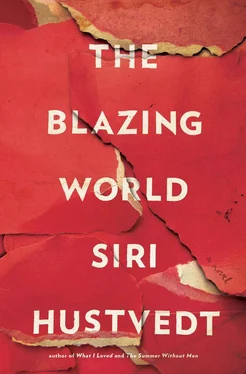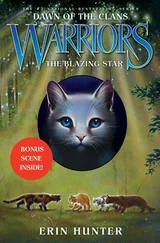She whined. The sound of her whining made me close my eyes, made me wince. You disgust me. You sound like a kicked dog. Who said that? Richard said it, cruel bastard that he is.
High protestations from Ruina followed. She is suddenly enlivened. In her feeble way, she fights back. Her voice rises into new registers, high, splitting sounds of pain. That’s mean. You’re a mean, horrible man. Blubbering follows.
I am not mean. I am reasonable. You hear me. I am just speaking rationally. You, on the other hand, are acting like a hysterical child. I ask you to stop right now, immediately.
Ruina is crying. She is holding the pillow to the masked face. I imagine that the mask moves. I see the corners of the mouth move downward, and I feel the wrinkling of the forehead. I feel invigorated by my anger. Richard stands up and walks to the sofa in three swift strides. He grabs her by the shoulders and begins to shake her. She is loose as a rag doll. I lift my hand to smack her hard. The masked head is thrown back, and Rune is laughing. The laugh enrages me. The laugh storms inside me. I lift my hands from Rune’s shoulders. I make a noise, a hollow grunt. The game is over.
We take off the masks.
I feel shaken, a bit shocked. Rune is jovial. He repeats this sentence: We have it on film.
But Richard and Ruina have unsettled me. I told him so as he snipped the rubber bands off the steamed lobsters. Why had it gone in that direction? Who had led the way? Why had he made Ruina so wimpy? Is that his idea of what women are? I wanted to talk about it, but he said that I always wanted to interpret everything, and enough was enough. It had been fun, hadn’t it? And I felt both oddly relieved by his humor and still troubled. Our conspiracy, he said, was interesting, damned interesting, and he sure as hell wasn’t going to let it go yet.
He talked about an artist friend who had hanged himself last year. A woman he loved had left him.
It must be terrible for her, I said.
And he said that some deaths are more beautiful than others.
I said I didn’t find death beautiful, except maybe the perfect death, dying in one’s sleep at a hundred.
God, that’s boring, he said.
I must think it through now. I must find some distance. Harry is trying to understand what has happened.
Saturday, June 9, 2001
I called Rachel this morning. We talked for almost an hour. I wanted to tell her about Richard Brickman, but something stopped me: shame. I am ashamed of both Richard and Ruina.

Ray has had a stent put in his artery.
Who are you, anyway, Harry, a wimp? Who cares about this little theatrical event? Isn’t the world in thrall to actors, especially to those who press themselves to extremes, who starve themselves for authenticity, who rage and gnash their teeth and turn themselves into demented patients or idiots savants or leering, cannibal psychopaths? Are we not all malleable beings made of putty, who can be pulled and pressed and reconfigured? Doesn’t all art partake of this extension into others? What’s the big deal? This was next to nothing, no violence at all — just a shaking of shoulders — a little anger, a laugh. Why worry?
Because Brickman was there, fully formed. Who is that man?
And yet, consider this, too: He may be the avenue to the project. Didn’t I say it: the dizziness of exile? Exile into the other.
I called Bruno, too. (I will never tell him about the masks.)
Cleo is his salvation, but I knew that. Jenny needles him. Liza is taciturn but much sweeter to her old dad. He tells me, in a typical soaring moment of hyperbole, that he has botched fatherhood, and I tut-tut the comment because it isn’t true. They want to see him, after all. They leave their spouses to come to Papa. And Liza has let him feel the movements of the fetal boy under her skin, the first grandchild, and he wonders why this unborn child is so much more exciting for him than the first time around. And I tell him he was afraid then, and he isn’t afraid now. He doesn’t have to take care of it, and we laugh, and soon he makes some comments about my clit, “ever on alert,” he says, and how his tongue longs for it, the clit, and I make a few false moans on the telephone, and he yuks it up. Laughter is a boon. He asks me about my gigolo, the slithering pretty boy, but his tone is not cruel, and so I take it. I tell him the project is coming along and that it’s “interesting,” borrowing Rune’s word. Yes, it’s interesting. And then we can’t wait to see each other, and he hopes Francis, Liza’s lawyer husband, whom I’ve never met, will not insist they call the baby Brandon — so sissy, so meatless. How could Bruno tolerate a grandson named Brandon? He plans to write here on the island. We do not mention the bloody poem. He knows what I think — write the memoir!
It wasn’t easy to work today with the resonant anxiety beneath my ribs.
At four, I found him lying on the sofa reading a book on Houdini. He waved it in the air and delivered facts — the man’s father had been a rabbi in Appleton, Wisconsin; Houdini loved his wife, Bess. Twenty years before Kafka published his Metamorphosis , the two Houdinis, husband and wife, traded places in a locked trunk and called the act Metamorphosis . (The German word is Verwandlung , but Rune lives entirely in English.) The master magician could regurgitate small keys at will, dislocate and relocate his shoulders at will, and had learned by practicing in an oversized bathtub to hold his breath for three minutes. Rune said he, too, was practicing not to breathe, and when I asked him why, he said he had his own projects.
He wanted to play again, change masks. I’ll be Richard, he said. I thought to myself, that’s impossible, you can’t be Richard, you don’t know him, but I didn’t say it. I said, no, another time. I wasn’t up to it. We talked some more, but just blather, and then he said, I think Ruina should get her revenge on the bastard, don’t you? I must have looked confused. If we keep the game going, he said, she’ll have to fight back, won’t she? I had to think about it. I understood I had cut myself off from the ongoing story out of dread.
Rune thought the film sequence could be used outside the Diary. We’ll put it into a piece, he said, maybe your piece for me. I felt him watching me. I tried to be blasé. But what if it’s bad? I said. He had already watched it several times, and he wanted to see it on a larger screen. He could hook it up to the television.
We watched the masked aliens in silence. I noticed that I had forgotten large chunks of our dialogue and that the game had lasted longer than I had thought. As a spectator, I saw immediately that without the masks the exchange would have lost its power. As it was, I felt startled by the vapid dialogue. The authoritarian Richard and the cringing Ruina were types lifted straight from melodrama or soap opera, but their immobile, artificial faces — my empty creations — enhanced the archetypal character of their struggle, and their gestures took on a quality of pathos.
Pathosformel ?V
Master and slave locked in their contest for recognition?VI
Role-playing gone mad?
Cultural parody written in capital letters?
Was this TV show the objective view? I noted that my green sweater had lost its shape and hung loosely over my substantial breasts, that beneath the man mask, my own flaccid chin fell into a neck with no Adam’s apple, and that my hair floated out around the false face in a frizzed halo, but somehow these physical details did not feminize Richard. They were overpowered by the mask and its, or his, decisive movements. And despite Rune’s rounded biceps, broad shoulders, and flat chest, his quivering Ruina, crunched up in a ball and crying by the end, read as womanly. Performativity.VII The particulars of the room, with its fireplace, big conch on the mantel, and Calder print on the wall, were submerged by the raw emotion that passed between the two players. Was it pretend? We watched it again.
Читать дальше













